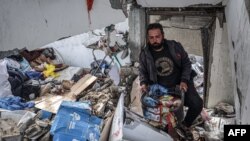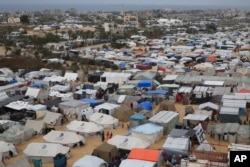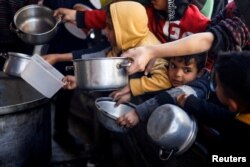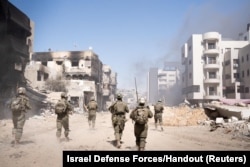U.N. aid agencies warn the crisis in Gaza has reached an unprecedented level of despair as Israeli attacks continue and hunger stalks the civilian population after months of inadequate humanitarian assistance.
“Let us be clear: Lifesaving aid is being obstructed. Lives are being lost. Dignity is being denied,” said James Elder, a UNICEF spokesperson.
“The deprivation, the forced desperation, means despair pervades the population. And people’s nerves are shattered amid unrelenting attacks,” he said.
Speaking in Rafah, Elder told journalists in Geneva Tuesday that the city was “unrecognizable” from when he last was there three months ago “because of the congestion, and tents on street corners and sandy plots.”
An estimated 1.2 million Palestinians have crowded into Rafah to escape fighting in other parts of Gaza.
Elder described living conditions in Rafah as “hellish,” noting that one toilet was available for every 850 people and one shower for every 3,600 people. Calling Rafah “a city of children,” he said, “the endless talk of a large-scale military operation in Rafah,” a city of 600,000 girls and boys, was highly concerning.
He noted that the situation in northern Gaza, where food is scant and hunger pervasive, is particularly dire.
In recounting a trip he undertook to the northern city of Jaballa two days ago, he said there were crowds of tens of thousands of people standing on the rubble in the streets “placing their hand to their mouth--that universal sign of hunger--desperately asking and seeking for food.”
He said that when he entered the Gaza strip a week ago there were hundreds of trucks with lifesaving humanitarian aid waiting to get to people in urgent need “but they were on the wrong side of the border.”
“Hundreds of U.N. and international NGO trucks are currently backlogged, waiting to enter Gaza,” he said.
The ongoing war was triggered by the October 7 Hamas attack on southern Israel that killed some 1,200 people and resulted in 240 being taken hostage. Since then, Israel’s offensive in Gaza has killed more than 31,000, according to Gaza health authorities.
An analysis by the Integrated Food Security Phase Classification System (IPC) report released March 18, warns that Gaza’s “entire population” of some 2.3 million people—is enduring high levels of “acute food insecurity,” and that half the population is suffering from “catastrophic” acute hunger.
In a follow-up to that report, the U.N. Food and Agriculture Organization last week said that famine is projected to occur “anytime between now and May 2024” in Gaza’s northern governorates.
“There are cases of death as a result of starvation and those are the early indications of famine,” said Abdulhakim Elwaer, the FAO assistant director-general and regional representative for the Near East and North Africa.
Speaking from Cairo Tuesday, he said, “I hope we are not waiting for a full famine declaration because the situation as it exists calls for action, which is long overdue.”
He noted that currently the only available access to the north is through the south.
“The north remains a total blockade and is inaccessible and we have enough evidence that shows there is ongoing starvation,” he said. “Urgent measures are needed to avert famine in Gaza. Restoration of unfettered humanitarian access is crucial to prevent deterioration of the situation.”
Jens Laerke, spokesperson for the Office of Coordination of Humanitarian Affairs, OCHA, said that under international humanitarian law, the parties to the conflict “must allow and facilitate rapid and unimpeded passage of humanitarian relief for civilians in need.”
He said that Israeli authorities have a right to control and inspect aid, but they also need to create “an enabling environment to move it around.”
“You cannot claim and adhere to these international provisions of law when you block UNRWA (the U.N. relief and works agency for Palestine refugees) food convoys,” he said.
Israeli officials reject accusations of blocking aid. They say they have increased aid to Gaza through a new gate to the north that opened earlier this month, and say it is the responsibility of the U.N. and other aid agencies inside the territory to deliver the food and other supplies.
Israel also accuses Hamas of stealing humanitarian aid – a charge Hamas denies.
Before the war, UNICEF said that less than one percent of children under five in Gaza suffered from wasting, a condition that affects acutely malnourished children. Today, it says one in three children under two years of age are acutely malnourished.
A week ago, UNICEF’s James Elder went to Kamal Adwan Hospital--one of two hospitals in northern Gaza where more than 20 children reportedly have died of dehydration and malnutrition.
“When I was there, I saw a room full of mothers and carers shuttering over children who were paper thin. Incubators full of babies who are born prematurely because of the stress on mothers, who are also malnourished.”
He said, “Mothers have done so well to keep children alive from bombardment. They know children now face starvation very simply because of a lack of food. People in the north, when I speak to them now, say they are mainly surviving on a type of grass with lemon.”
He said famine could be averted if Israel would open the Erez crossing point in northern Gaza, “that is 10 minutes from those at risk of starving to death. Ten minutes.”
“Open that and we could turn this humanitarian crisis in the north around in a matter of days. But it remains closed,” he said.





